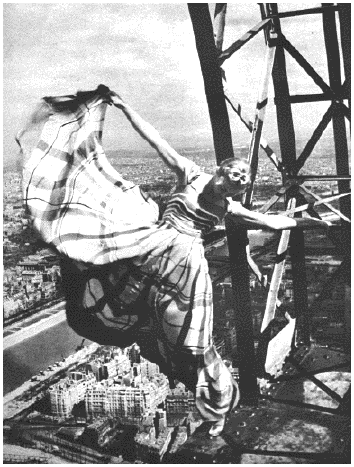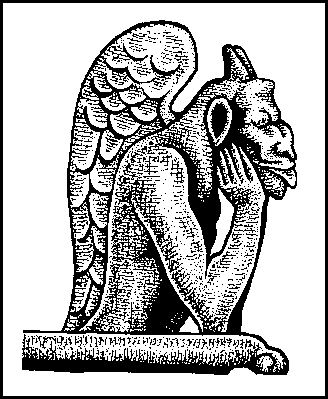l'Ile de Frqnce
- 1ere Always carry one each of the 17 different kinds of tickets they will sell you in any Gare or tabac;
- 2ieme Insert any one of these tickets, at random, in the ticket machine of any public conveyance;
- 3ieme When the ticket machine flashes
 On buses, in particular, the drivers show an ostentatious disdain for
such matters of mere administration as the passengers' tickets. On
trains, there is the ever-present threat of encountering a Controlleur,
who will send you to Devil's Island if you have the wrong kind of ticket.
But in that unhappy event, you can always fall on the mercy of the court,
claiming to be a poor ignorant visitor.
On buses, in particular, the drivers show an ostentatious disdain for
such matters of mere administration as the passengers' tickets. On
trains, there is the ever-present threat of encountering a Controlleur,
who will send you to Devil's Island if you have the wrong kind of ticket.
But in that unhappy event, you can always fall on the mercy of the court,
claiming to be a poor ignorant visitor.
Legend has it that there is an alternative and strictly legal means of access to the transportation network. This is to purchase a carte orange for the month, supposedly valid on every form of transportation up to and including the Ariane spaceship. Unfortunately, to do this one has to present a photo of oneself, and I do not photograph. Like a vampire or a sub-atomic particle, I produce only a sort of fuzzy track on the photographic emulsion. It is only through this mysterious property that I have been able to evade the police of three continents. In fact, the Prefecture de Paris has had an arrest warrant out on me for thirty years --- there was a trifling contretemps long ago involving train tickets, which we do not need to go into --- but they could never catch up with me, for lack of a photo.
Speaking of thirty years, I have been revisiting some of my old haunts in Paris. The Boulevard Saint Michel is exactly as it was in the 1960's, except that the population has mysteriously grown younger. (But, then again, I notice that phenomenon everywhere.) The Librairie Joseph Gibert is still there, distributed over several shops, with its street-stalls of the most obscure remaindered books, including great children's books. The outdoor market on the Rue de Buci is still a treat. But the horsemeat dealer on the Rue Mouffetard, once marked by a horse's head doree, has disappeared and the street, considerably yuppified, is now all restaurants.
Montparnasse, once an artsy area with music shops, as well as certain celebrated cafés, now huddles under a huge, featureless, black skyscraper of the kind which graces American downtowns from Detroit to Seattle. From a distance, these things look like nothing at all, just a sort of gap in the field of vision. I like to refer to them as the "detached retina" school of architecture. "The best location in Paris is inside le Tour Montparnasse," I said aloud as some people and I looked up at the tower, "because you cannot see it from there." An old groaner, I know; but I was very pleased with it because it was my first joke in French this trip.
 On one of my explorations, I surfaced from the Metro in the vicinity of
the Ile de la Cite, and found myself in the midst of an outdoor bird
market. I wandered among the cages and at one cage a powerful, magnetic
field developed between myself and a particularly fine perruche, a
beautiful, intelligent, well-spoken bird with blue-grey feathers. It was
a case of love at first sight. Only with the greatest difficulty did I
resist the urge to buy the bird on the spot. I could have given it a
home --- a good home --- but only for eight weeks, after which I must leave Paris.
What would I do with it then? I would have to boil and eat it! As a poet
(was it Phillip Larkin?) once wrote: Each man boils the thing he loves.
On one of my explorations, I surfaced from the Metro in the vicinity of
the Ile de la Cite, and found myself in the midst of an outdoor bird
market. I wandered among the cages and at one cage a powerful, magnetic
field developed between myself and a particularly fine perruche, a
beautiful, intelligent, well-spoken bird with blue-grey feathers. It was
a case of love at first sight. Only with the greatest difficulty did I
resist the urge to buy the bird on the spot. I could have given it a
home --- a good home --- but only for eight weeks, after which I must leave Paris.
What would I do with it then? I would have to boil and eat it! As a poet
(was it Phillip Larkin?) once wrote: Each man boils the thing he loves.
The publicists of French tourism have been holding out on us in not telling more about idyllic Gif-sur-Yvette, south of Paris, where I am staying. It is a veritable little theme-park of "France-Land:" narrow cobbled streets, a medieval chateau and church, tables on the sidewalk at the local cafe; and the picturesque inhabitants are always to be seen carrying their baguettes to and fro. Indeed, technically one is not permitted on the street in idyllic Gif without a baguette, or at least a brioche. There are Controlleurs who will send you to Devil's Island if they catch you abroad without the requisite baked goods in hand, although I believe one can buy a certain kind of monthly ticket which, when properly validated, permits one to take one stroll per day sans baguette.
All of the inhabitants of idyllic Gif are of the cheery, smiling, non-stressed, non-Parisian variety who always smile and say "Bonne journee" to each other and to strangers as well. There are charcuteries on every hand --- if you have any hands left over, that is, from carrying your quota of baguettes and brioches. There are ducks on a meandering ruisseau in the Parc, and I was even charmed to find picturesque characters in berets playing at Boules nearby. One day, in fact, I went into the Parc and found it completely over-run by Boules-players; there were hundreds of them, jamming every square meter: on the grass, along the trails, in the soccer field, among the ducks, in the trees, all madly tossing the Boules. From time to time, a voice emerged from a loudspeaker somewhere announcing 24 contre 22, meaning an assignment of two teams to play against each other.
I was astounded. A giant Boules team-tournament in tiny Gif? Surely the assembled bouleurs exceeded the entire population of the town. Where did they all come from? Later, someone told me that the Departement organizes these competitions for les chomeurs, the unemployed. Too bad. I had been hoping to get into a game of Boules one day, and so learn a little about the game. But I guess being on sabbatical would be viewed as different from being en chomage, at least from an administrative point of view.
My comprehension of French varies inversely and very steeply with the speed of utterance. People with slow, measured speech --- President Chirac, for example, or the average funeral director --- I can understand perfectly. But if the speed increases by only 40% or so, it all dissolves for me into something that might as well be Basque, Ukranian, or Nahuatl. My own accent is very good, and people always understand what I say perfectly and show me to the bathroom. However, it is getting a bit tiresome to make a brilliant point about world-historical socio-politics only to be directed to the toilette.
 My other linguistic problem here is remembering which keys on the
French clavier d'ordinateur are inversed with respect to the
American computer keyboard. Zhen I forget, the resulting lqnguqge co,es
out like this. Strqngely enough, qfter q zhile I hqve begun not only to
type like this but to tqlk like this qs zell. It co,es out sounding q
little, but only q little, like French. Could that be why they keep
directing me to the bathroom? If only I had bought ma petite perruche in
the bird-market, I could have asked it for The Answer.
My other linguistic problem here is remembering which keys on the
French clavier d'ordinateur are inversed with respect to the
American computer keyboard. Zhen I forget, the resulting lqnguqge co,es
out like this. Strqngely enough, qfter q zhile I hqve begun not only to
type like this but to tqlk like this qs zell. It co,es out sounding q
little, but only q little, like French. Could that be why they keep
directing me to the bathroom? If only I had bought ma petite perruche in
the bird-market, I could have asked it for The Answer.